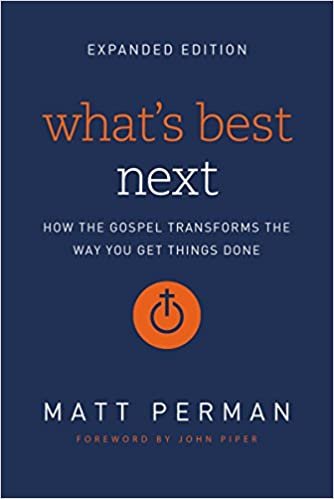What’s Next Best – How the Gospel Transforms the Way You Get Things Done
By: Matt Perman

One day during lunch hour, I was perusing my favorite local thrift store and I would have most likely passed it by if I had not noticed John Piper’s endorsement on the front cover. I usually do not pay much attention to the forward or preface of books, but when John Piper pours on the praise, then I am all ears. Piper is a force to be reckoned with in Christian ministry and Matt Perman has been a key contributor to Piper’s Desiring God platform. Thankfully, this book found a place buried on my bookshelf until I gathered the gumption to take it out and begin chipping away.
As my responsibilities at work and home continue to grow, I find myself overwhelmed by the number of tasks that need to get done. There are many great resources and methods to productivity, but not all are created equal. This year I dove into the book What’s Best Next by Matt Perman and fell into an avalanche of helpful information that has helped me focus on what is important, and sequentially, taught me practical techniques to get those important things done. Unlike any productivity book that I am aware of, What’s Best Next is a gospel-centered Christian approach to work and productivity, which aligns with my worldview and thus challenged me in ways that other productivity books have not.
Be warned, this is not the type of book that you should read over the course of one week. Each chapter is dense with information and insight. I have to admit, due to the weight of each chapter, I was glad that at the end of each chapter there is a section called “The Box” which summarizes the Core Point, Core Quote, Core Passage, Immediate Application and Further Resources.
Cover to cover the book is 350 pages and it reads as if Perman has been studying the subject of productivity his entire life. The number of books referenced alone would take normal folks like me years to read. Luckily, Perman summarizes many core concepts from other productivity methodologies and applies them in life-giving, Christ-centered ways. Although I could certainly dive into many of the referenced resources, Perman did all the hard work by vetting the best information and including it in one book.
There is absolutely no way that I can succinctly summarize all the information included in each section of What’s Best Next, of which there are 7, but let me highlight a few of my favorite chapters. By the way, at the end of book, the author recaps the entire book in 500 words which is a nifty tool to refresh your memory on the key principles on a regular basis.
Chapter 3 is titled Why We Need to be God-Centered in our Productivity. This chapter dives into lack of fulfillment which is referred to as one of the “villains” that gets in the way of getting things done. This may be the most distinguishing chapter of WNB compared to other great works on productivity such as Steven Covey’s “First Things First”. It offers the idea that true productivity should not be centered on personal gain but focused on a greater cause. If we are focused on self-improvement alone, then we will undoubtably come up empty handed. We have all heard sad stories of people that have attained everything the world has to offer and, in the end, felt empty. It is well known that being self-centered in our pursuit of success is a dead end but Perman takes this thought one step further by explaining why we need to be God-Centered rather than just others-centered. His message is rooted in the idea that our chief aim is to reflect and glorify God. The key Bible passage for the chapter is Proverbs 3:5-6. The conclusion of the chapter leads the reader to reflect upon their life purpose and without confronting our purpose the application of the remaining chapters is useless.
In chapter 10, titled The Core Principle for Making Yourself Effective, Perman dives into the main issue that prevents us from being truly effective. It starts off by stating that the key to being productive, which closely resembles the book title, is “know what’s most important and put it first.” At the end of a long day, I have often felt like I worked very hard yet I have not accomplished what I really needed to get done. It is maddening when there is little payoff to the hard work that we dedicate ourselves to day in and day out. Solving this problem is essential at work and at home. Perman explains that there are actually two steps to address the issue. First, you must know what is most important. Secondly, what is important must actually be put first. The next 4 sections dive deep into 4 main categories to accomplish this main goal of making first things first. The 4-pronged approach include Define, Architect, Reduce and Execute.
Chapter 22, the last chapter in the Execute section, is titled Daily Execution. This chapter provides “nine principles for making things happen every day that you can put into practice right now.” The nine principles are as follows.
- Plan your day
- Schedule your day at only 70 percent capacity or less
- Consolidate your time into large chunks
- Do the most important thing first
- Do one thing at a time
- Focus on outcomes, not activities
- See your day in terms of people and relationships first, not tasks
- Ask in everything: How can I build up others
- Utilize the key question in the moment: What’s best next?
My main takeaways from this book has been principle number 9. I constantly fail to plan my day properly and focus on just one thing at a time but when I find myself stuck, overwhelmed and not sure where to go next I often go back to the simple question of “What’s best next?” I hope that this becomes a mantra that you take with you into your busy schedule. What could be more important and empowering than knowing what you should do next and executing what needs to be done. The world needs more people that can get things done and this book can help us become the types of people that will lead a purposeful life.
You can find the book at your local thrift store or on Amazon.
-Matt

